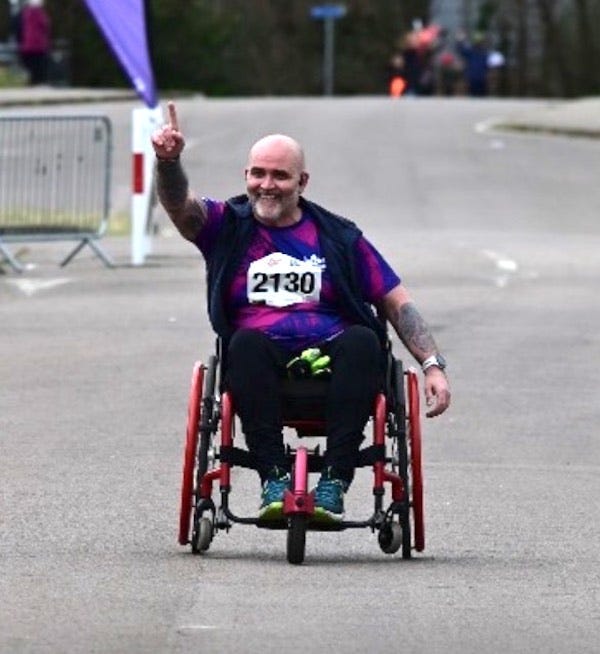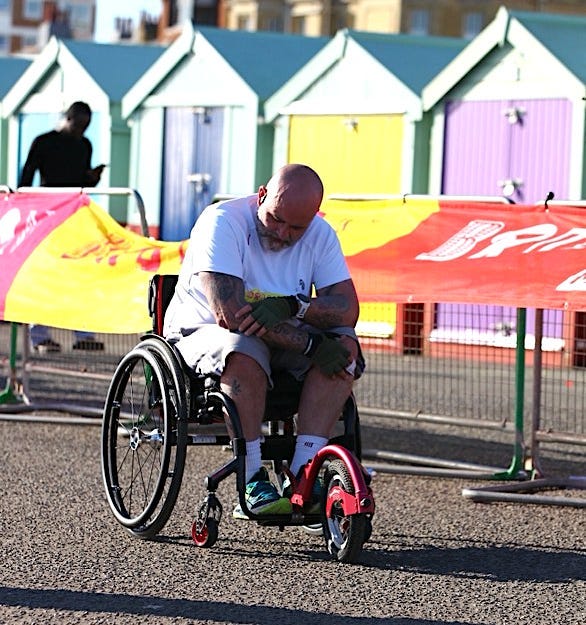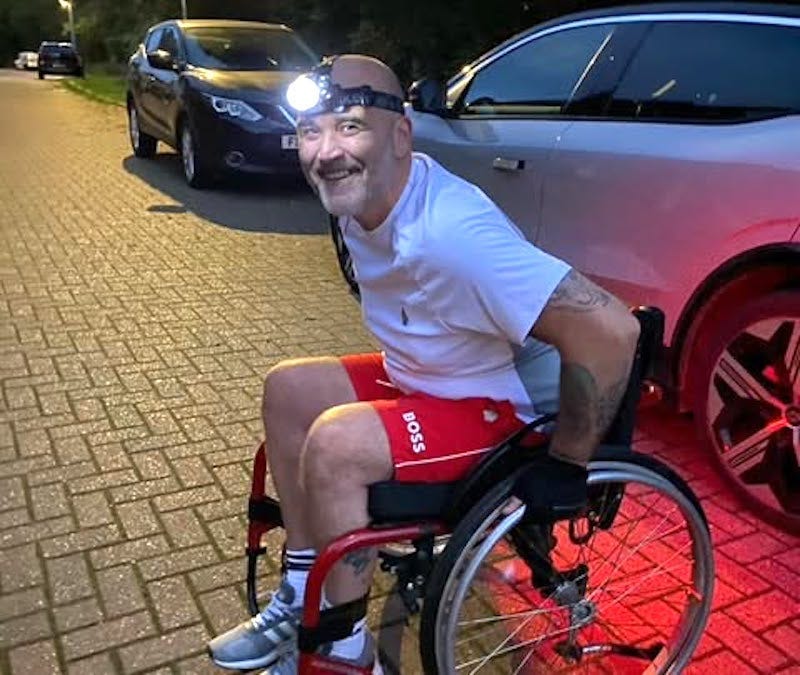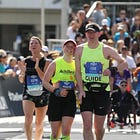Ben Parker: The wheelchair athlete set to push his way across the country
When he was diagnosed with multiple sclerosis in 2009, Ben Parker decided to keep moving forward in life - that attitude is now set to see him take on a 740km journey from Lowestoft to Land's End

Hundreds of kilometres. Across the breadth of the UK. In a wheelchair. With multiple sclerosis.
As you add together each element of Ben Parker’s planned challenge to push himself from Lowestoft to Land’s End, it gets more and more incredible.
That’s before you consider the 48-year-old first used a wheelchair not much longer than two years ago - and then only grudgingly when he finally had to admit he could no longer move around with the help of a walking stick.
The Saffron Walden resident’s life changed completely in 2009 when he was diagnosed with multiple sclerosis, a debilitating condition which involves the immune system attacking cells in the brain and spinal cord.
But MS hasn’t stop him moving forward. Following his diagnosis, he retrained as a maths teacher after realising his condition meant he could no longer work as a bus driver. To start his new career, Ben had to retake his GCSEs, do his A levels and complete a maths degree.
It is that kind of determination that saw him turn to parkrun to boost his fitness after he finally had to accept he needed a wheelchair, something he says provided an unexpected new lease of life.
Since then he has completed half- and full marathons, and has an ultra event lined up. But his ultimate challenge - for now at least - is to push his wheelchair from Ness Point in Lowestoft, the most easterly point of the UK, to Land’s End over a two week period, covering distances of around 50 to 60km (31-36 miles) per day.
Starting on July 27, the exact route for the trip is still being ironed out but is likely to total around 740km (460 miles).
It will take him through Cambridge, past Leighton Buzzard, and eventually all the way down to Okehampton in Devon before he finally reaches Land’s End.
Pretty impressive for anyone, but especially for a man who had never completed a race of any kind prior to his diagnosis.
The challenge that aims to ‘enrich people’s lives’:




Ben is doing the challenge in honour of two charities; Andy’s Man Club, a male suicide prevention charity, and the educational charity, No Child Without.
He has already raised almost £3,000 for the two organisations, well exceeding his original £2,000 target.
“Everybody keeps asking if I’m doing it for the MS Society. No, they're a big charity,” he said.
“They’re cool. Everybody looks after them. We don't need to worry.
“Andy’s Man Club sets up meetings where men can go and talk and just get rid of the stuff that's on their mind, on their shoulders.
“Just get it out so they don't have to stress so much. I didn't realise until I started doing this that 12 blokes kill themselves every day.
“It's astonishing. It shouldn't be like that because it's not just them it affects; it's their families, it's their friends, it's their colleagues, it's everybody.
“And it's the people who have to - forgive the phrase I'm using - go and clear up afterwards.
“I don't mean that in a horrible sense, but it affects so many people. So, if you can save one life, you're actually making a few lives better.
“I think that's vitally important.
“The other charity is an educational charity, No Child Without, which is for young people who can't afford equipment, school trips, stuff like that.
“It will pay for them to do those things so that they're not left out, not left behind.
“I was one of those young people, so it just means a lot to me that those kids can get the same opportunity as everyone else.”
On his JustGiving page, he added: “I won’t be around forever but I’m hoping the mark I leave will go a little to enriching someone else’s life.”
‘Everything bad has sprung me forward’:
It was around Christmas 2008 when Ben received the news that he had multiple sclerosis.
The devastating diagnosis came with the extra pain of losing his job as a bus driver, a role he loved. But as Ben told Running Tales, “when one door shuts, another opens’ and rather than curl up on the sofa, he decided to use it as a chance to retrain.
It was to take him six years to get the qualifications he needed, but Ben’s diagnosis had set him off on a new career path as a maths teacher.
Such resilience is central to his story. The bus driver who left school with no qualifications who retrained as a teacher after being told his central nervous system was collapsing. The non-runner who had never completed a race in his life who is now aiming to propel his wheelchair hundreds of miles across the country.
The parallels are hard to ignore.
“I'd been having symptoms, when I look back at my medical notes, for about 10 years,” Ben told Running Tales.
“It got to the point where you can't have a bus driver driving with one eye shut, not being able to feel his feet properly, and not being able to feel his hands properly. It's just too dangerous.
“I had to give it up, which broke my heart at the time because I love driving buses. But when one door shuts, another one opens. I suppose that's the phrase that comes to mind.
“And for everything that's bad that's happened, it's sprung me forward in life and in my attitude.”
Ben’s career change was prompted by a conversation with a friend who needed some help when they were re-doing their maths GCSE.
“They said to me, ‘you should be a teacher’. This was quite close to the time when I stopped driving buses,” Ben said.
“It was that lightbulb thing. Yeah, that's what I could do. Why not be a maths teacher? Because I loved maths at school, although I didn't do very well at the time.
“I'm one of these people that if I make that decision, I'm going to do it.”
“Paris is always a good idea” - and so was finally using a wheelchair:
“When I was diagnosed, my first thought was, ‘it will be okay’,” Ben told Running Tales. “My second was, ‘I've just got to hold on’. That was it.
“And I'm still at that point today, if I'm really truthful. I've just got to hold on, keep holding on.
“Because you never know what might happen at some point. I know they're completely different illnesses, but in the ’80s when HIV and AIDS first appeared, everybody was terrified of it.
“But I suppose that the science and medicine has got to a point where people don't have to be as scared. And that's all I'm doing. I'm holding on until I don't have to be as scared.
“Because if I sit back and think about the connotations of what's going to happen, it's a very scary thing.
“I do think about it from time to time, and it gets me down. It's not a daily thought. So, I've just got to keep pushing forward and keep doing my best. That's it. Keep trying.”
One part of the condition which constantly worried him was the degeneration of his legs.
Despite having to use a stick and his walking becoming increasingly worse, for a long time, Ben fought off the prospect of having to use a wheelchair.
It was when he went on holiday to Paris around two years ago, that he finally gave in, a decision he said has given him a surprising new lease of life.
“I battled it [using a wheelchair] for a good few years,” he said. “My walking, my gait, it was progressively getting worse.
“My partner and I went to Paris a couple of years ago, and I struggled even to walk one street from the hotel.
“I had a walking stick, but it just became really apparent I needed a wheelchair even though I’d fought it off for so long.”
They borrowed one from the hotel and Ben’s partner, Louise, ended up doing all the hard work, pushing him around for the day.
Ben said it had been a hot day and he had probably been “a bit of a git, saying I want to go over there, now I want to go there”.
“I bought her a lovely necklace to say thank you,” he added, before admitting he had felt embarrassed about the idea of being in the chair.
“I’d felt embarrassment about walking with a stick, because - even if I don't look it - I feel young.
“And, I was constantly thinking ‘I'm too young for that. I'm too young’.
“So, when I had to admit the wheelchair was necessary - and it was necessary - it was something I wasn't very happy about.
“But it was something I needed to do. And, you know, in life we have to make these decisions, don’t we?”
Ben said finally deciding to use a wheelchair has made him “feel a fuller human being again.
“It sounds a bit weird, but I can move around properly. I can do everything again.
“I'm a bit more independent and it's just a beautiful thing.”
Finding parkrun - ‘Tough but wonderful’:
It was a colleague at work who first suggested Ben tried parkrun.
Initially, he was dismissive, still trying to get to terms with using a wheelchair at all let alone taking part in an event in one.
Eventually, though, he took the plunge, taking on what he describes as a “hilly” Harlow parkrun for the first time in June last year.
It took him an hour and 18 minutes to get round, and he stopped four times along the way, but Ben completed the course - and, more importantly, he loved it.
“I was shocked at how unhealthy I was and how tough it was,” he said.
Despite finding the event a challenge, and having been offered the chance to raise his hand to ask for help from course volunteers if he felt he needed it, Ben stubbornly finished entirely under his own volition.
“I'm a stubborn so-and-so. I never put my hand up,” he said. “I just said, ‘if I'm struggling, I'm going to struggle and I’ll do it by myself’.
“This is probably my ethos. If I struggle, I'll struggle and I'll do it. And yeah, I did it and it was amazing. It was absolutely amazing.
“I was very happy. I knew I was coming back.
“I didn't like the one hour 18 when I was looking at people doing it in 17, 18 minutes.”
Since then, Ben has consistently improved his parkrun time - his personal best is now 37.02 - and he’s continued to enjoy it.
“I just kept going back and I kept turning up and people were genuinely so welcoming.
“I’ve met so many wonderful people. I’ve even had people online email me and message me and say, ‘you've inspired me to actually do something in my wheelchair’.
“I plaster it all over social media about what I'm doing and how I'm doing it.
“I've loved it from day one - even though it was tough, really tough.”
Emotional moments and constant determination:

Ben’s enjoyment of parkrun encouraged him to try longer, more competitive events, with the Vitality 10k in London his first attempt at that distance.
Once again, he fully embraced the experience and as he did so the enormity of what he was achieving hit home.
He said: “It was the furthest I'd ever pushed. And when I crossed that finish line, near Buckingham Palace, something weird happened.
“I was really overcome with emotion and had to bury my head in my t-shirt and cry my eyes out.
“For some reason, it really hit me for a minute or two and I just felt so overwhelmed with what I'd just done.
“Ten kilometres is a long way for anybody. But to do it in a chair, just an everyday wheelchair, it was amazing. I felt really amazing.”
Incredibly, it was not only the first race he had finished in a wheelchair but the first of any type he had completed.
“I've never been a runner,” he said. “I used to watch the London Marathon every now and then when I was a kid.
“There was a guy when I was at primary school who came in and showed us his foil sheet from the London Marathon.
“I remember thinking, I'll never be able to do that. He was somebody I was in awe of.
“I remember it really vividly. There were only a few times in primary school where I was amazed by things and that was one of them.
“So, when I ended up doing a marathon and with the emotions thing, it's to do with where I am in life.
“One of the things I say out loud as I'm pushing - it might seem a bit dramatic and a bit weird - but it's, ‘I don't want to die, I don't want to die’.
“That's all I'm saying to myself when it's tough, ‘I don't want to die, keep pushing, keep pushing’.
“Running can be really tough at times and you have moments where you doubting what you're doing is right and you’re doubting why you're doing it.
“So, I have to remind myself. I've only cried properly, I would say, twice. It was at the 10k - the Vitality - and at the Brighton Marathon.”
On that second occasion, Ben found himself a kilometre from the finish but with seemingly nothing left.
In the end, he made it across the line in seven hours, summoning up reserves of energy he didn’t know he had.
“It’s an amazing release when you cross that line,” he said.
“I don't think people realise the emotions you go through because throughout a race you have the high of starting, then you go through the calm of just getting into your pace and your rhythm.
“You go through the desperate moments of ‘what the hell is this about?’ and you think I've got to stop.
“I've done two marathons and both of them I got to about 25 kilometres and thought I’d do one more kilometre and then I’d stop.
“And I just kept saying that until I got to the end.”
Since that first 10k in London, Ben has been consistently upping his distance. Half-marathons were followed by a couple of marathons and then an ultra.
He said his aim is to constantly push his own boundaries: “It’s very difficult to tell yourself that at some point you're not going to be able to do this. So, why not do it today?
“It's as simple as that. So, keep pushing, keep doing it.
“If I can't do it at some point, I can't do it. And I'm not going to beat myself up.
“I’ll just dust myself down and try again. That's as simple as it is.”
The throwaway remark that sparked an epic idea:
It was what Ben called a flippant comment that sparked the idea to wheel across the country.
After a couple of early parkruns, the Principal at the school he works at asked how things were going.
Ben jokingly replied they were progressing so well that he’d soon be wheeling his way across the country.
“It was a throwaway remark,” he said, “but she said I should do it for charity.
“And then I said it to somebody else, and somebody else. When you say it often enough, you've got to go through it.
“Because part of me was thinking, ‘I could really do this and it would be great fun’.
“It won't be fun. It's going to be horrible. But I'm going to love it.”
Ben said the route will avoid ‘A’ roads in favour of smaller ‘B’ ones, adding that he’ll be using Google Maps and Strava to plot his way across the country.
“I’ll chuck it (the route) in Strava, see where it’s going to be tough and just go and do it,” he said.
Whatever happens, the way his life has changed in the last two years, since finally using a wheelchair for the first time, has been nothing short of “astonishing”.
“It’s jaw dropping,” he said. “Ben Parker from two years ago wouldn't have foreseen this.
“People who throw themselves into the whole process of what running is will find that.
“I know I don't run but I push and it's amazing. I'm so glad I’ve done it.
“When I did that one hour 18 parkrun, people were saying as they were going past me, ‘well done mate, well done’.
“I am now that bloke going past saying those things. I'm doing what people did for me.
“Nobody looks down at you because there's so many people that aren’t even doing it. That are still on their sofa.
“Give it a go, just do it. It's worth it. It's brilliant. You will get all the encouragement, you'll get all the help you need when you turn up.
“You don't get any help if you don't turn up, do you? So, just turn up.”
Why do you run, walk or push? Let us know in the comments below
Please don’t push me! Why runners shouldn’t help wheelchair athletes without asking:

One somewhat unusual phenomenon many wheelchair racers have to get used to is the temptation runners seem to have to give them a push.
It’s something that those same people would never consider doing to a runner who was struggling to get up a hill, but somehow - and probably out of good intent - it is commonplace when it comes to wheelchair athletes.
Ben told Running Tales: “It's happened so many times when I'm out training.
“When I'm in my town and I'm pushing up hills, I've had people stop cars, jump out, run over and start pushing me.
“And I'm like, ‘man, I haven't asked you, leave me alone’. But I have to say it nicely.”
Ben said he knows people are “doing it from a good place,” but did admit to losing his temper on once occasions.
“It makes me laugh now,” he said. “I was doing a parkrun and was going up this slight incline.
“All of a sudden I lost all control of where I was going. I ended up going off the path and on to the grass.
“I thought I was being attacked by a dog or something. I genuinely did because a big dog had just gone past.
“When I turned around a lady in a mobility scooter was sitting there. She’d thought I needed help, so had just got behind me and started pushing me along with her scooter.
“And I did lose my temper. I wasn't rude, but I told her what she did was reckless and dangerous.
“It was by far the weirdest thing that has happened.”
“The thing is if you see somebody struggling, you want to help, don't you?” Ben added.
“It’s tough because some people, if they left it, they'd feel bad going home.
“So, I'd rather they tried to offer help than went home and thought, ‘I left that poor bloke struggling’.
“But I'd like people to ask.”
Further reading:
Support Running Tales:
Please help us keep producing Running Tales:










